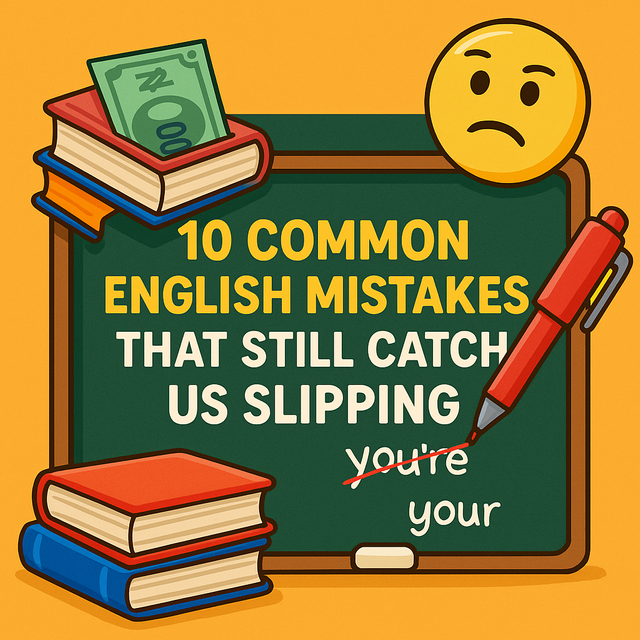10 Common English Mistakes That Still Catch Us Slipping 😩📚
Let me confess something real quick — English has embarrassed me more than once.
And while it’s not my mother tongue, it’s what we write tests in, speak at events, and post online.
So yeah, these little English slips? They matter.
Here are 10 common English mistakes people still make, including the two that changed my own results — one positively and one painfully.
1. ❌ “Am going out."
Correct: ✅ I'm going out.
We’ve all seen it: someone just texts “am coming” or says “am late” like it’s normal.
But “am” is a verb. It can’t start a sentence on its own.
Where it happens: WhatsApp chats, Instagram captions, even formal emails 😬
Fix: Just add “I” — “I’m coming,” “I’m sorry,” “I’m not around.”
2. ❌ “Your welcome.”
Correct: ✅ You’re welcome.
This one shows up on thank-you replies, status updates, birthday wishes... everywhere.
Why wrong?
- “Your” means belonging to you
- “You’re” means you are
So “your welcome” means someone owns a welcome 🤷♂️
Use “you’re welcome” instead.
3. ❌ Saying “Hi” when someone says “Hello”
Correct: ✅ Say “Hello” back
This one got me ₦2000 😎
At an event, the speaker walked on stage and greeted:
“Hello!”
Everyone mumbled “Hi” or kept quiet... except me. I shouted back “Hello!”
He smiled, looked at me and said “That’s how it’s done,” and gave me ₦2000 cash right there 😭💸
It might seem small, but responding appropriately shows attentiveness and respect — especially in formal settings.
4. ❌ Mixing up “There,” “Their,” “They,” and “The”
Correct: ✅ Know the difference
- There – refers to a place (It’s over there)
- Their – possessive (Their house is big)
- They – subject pronoun (They are happy)
- The – article (The man, the house)
I once wrote “the are going home” instead of “they are going home” in an English test.
Result? 💀 My lecturer dashed me half mark out of pity and wrote “CHECK SPELLING AND STRUCTURE” in red pen. Never again.
5. ❌ “It’s” vs “Its”
Correct: ✅
- It’s = It is
- Its = something that belongs to “it”
Example:
It’s raining.
The dog wagged its tail.
Mixing this up confuses even native speakers sometimes.
6. ❌ “I didn’t knew”
Correct: ✅ I didn’t know
The word “did” already puts your sentence in the past, so using “knew” is double past.
Just say: “I didn’t know.”
7. ❌ “I have went...”
Correct: ✅ I have gone
This one is everywhere!
Wrong: I have went to the market
Right: I have gone to the market
The verb “go” becomes “gone” in the perfect tense with “have.”
8. ❌ “She is more better.”
Correct: ✅ She is better.
“Better” already compares. You don’t need “more” with it.
Same with “more faster,” “more easier.” Just say “faster,” “easier,” “better.”
9. ❌ “I made it myself personally.”
Correct: ✅ I made it myself OR I made it personally
No need for “myself” and “personally” in one sentence — they mean the same thing.
It’s like saying “I reversed back” or “repeat again.”
10. ❌ “I did not wrote the test.”
Correct: ✅ I did not write the test.
Just like “didn’t knew,” the “did” already puts it in past tense — so the verb must stay in present.
## 💬 Final Words
Mistakes like these might seem small, but they can make a big difference:
- ✅ In exams
- ✅ In job interviews
- ✅ On social media
- ✅ Even when trying to impress a crush 😅
I’ve been corrected. I’ve lost marks. I’ve also been rewarded.
But now, I stay sharp.
Which of these do you hear often — or still struggle with sometimes?
Share in the comments. Let’s all learn together.

Upvoted! Thank you for supporting witness @jswit.
0.00 SBD,
1.12 STEEM,
1.12 SP